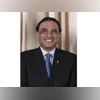Newly-elected National Assembly Speaker Ayaz Sadiq on Sunday summoned a joint session of the Parliament to elect the next president of Pakistan on March 9, a position that former president Asif Ali Zardari is almost certain to win again after nearly 11 years.
In a notification issued today, the speaker summoned the session at 10 am, with Zardari, 68, set to face off against his rival ethnic Pashtun politician Mahmood Khan Achakzai.
Zardari, who is a joint candidate of the Pakistan Peoples Party (PPP) and former prime minister Nawaz Sharif-led Pakistan Muslim League-Nawaz (PML-N), is set to become the president for the second time as he is being supported by the parties that enjoy a majority in the electoral college. He also served as president from 2008 to 2013.
Achakzai, 75, from Balochistan, is the chief of the Pashtunkhwa Milli Awami Party and was nominated by Imran Khan, the jailed leader of the Pakistan Tehreek-e-Insaf party. In Parliament, Achakzai would be supported by the Sunni Ittehad Council, the new home of the PTI-backed independent lawmakers.
Their nomination papers were filed in the Islamabad High Court for the presidential elections on Saturday and the scrutiny of the nomination papers will be held on Monday.
The new president will replace Dr Arif Alvi, who completed a five-year term last year. However, in the absence of the electoral college required to elect the president, Alvi is still in office.
The president is elected by an electoral college comprising members of the Senate, the National Assembly, and the four provincial assemblies. Voting is held through a secret ballot in Parliament and four provincial assemblies.
The president is the ceremonial head of the state and enjoys limited powers as he acts on the advice of the prime minister.
(Only the headline and picture of this report may have been reworked by the Business Standard staff; the rest of the content is auto-generated from a syndicated feed.)

)
